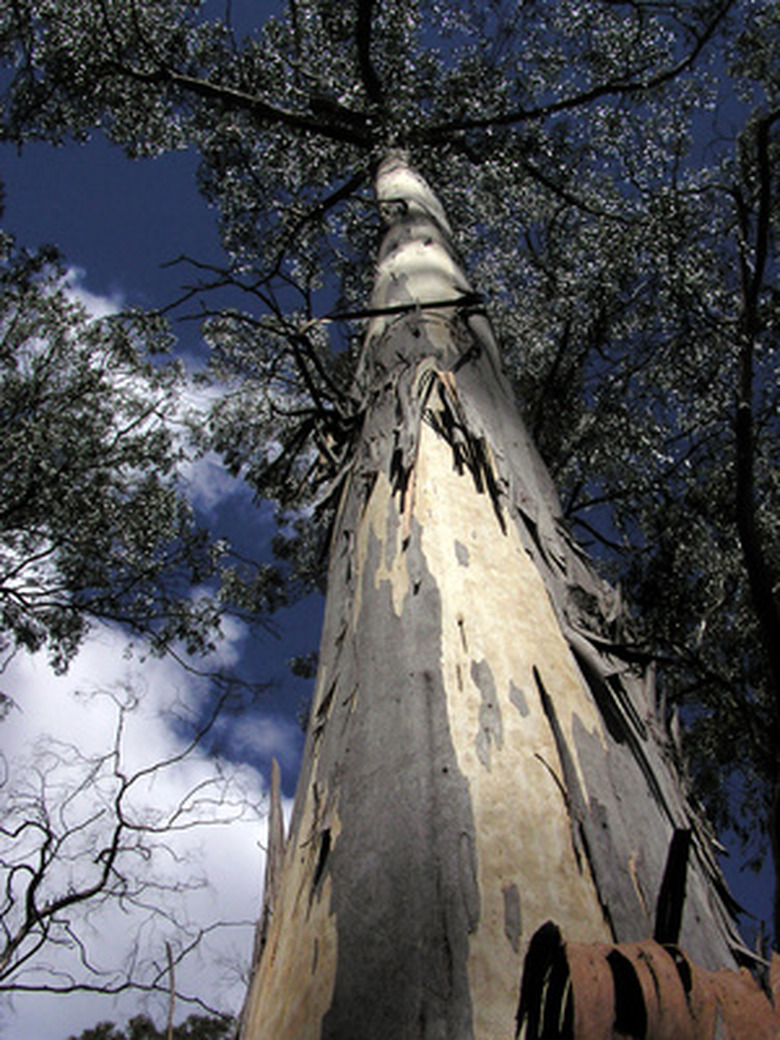Eucalyptus Leaves As Mulch
Eucalyptus leaves are popular to humans for their sweet scent and are commonly used natural deterrents for many pests, such as mosquitoes. Some gardeners will collect the leaves and place them around their plants as a form of mulch. When used improperly though, eucalyptus leaves will release a chemical into the soil that is dangerous to some food-producing plants. Eucalyptus leaves must be composted or they may adversely effect plant and crop production.
Features
Eucalyptus trees are classified as an allelopath, or a plant that releases either beneficial or dangerous chemicals to aid or inhibit the development of nearby vegetation. The release of chemicals can take place in a variety of ways, but most commonly eucalyptus will pose a serious threat to other vegetation when leaf or bark matter is placed to close to the soil without proper decomposition.
Plants Affected
The phenolic compounds released by eucalyptus trees can harm the development of most grasses, herbs and shrubs, according to the University of Minnesota. The allelopathic results are most often contained within 5 meters around. This fact makes eucalyptus an effective control agent for grass growth but unfit for common use as a mulch.
- Eucalyptus leaves are popular to humans for their sweet scent and are commonly used natural deterrents for many pests, such as mosquitoes.
- The release of chemicals can take place in a variety of ways, but most commonly eucalyptus will pose a serious threat to other vegetation when leaf or bark matter is placed to close to the soil without proper decomposition.
Safety
Eucalyptus can be composted to help control its allelopathic tendencies. By grinding the leaves and bark of of the eucalyptus tree and letting them decompose naturally within a compost pile, much of the dangerous chemicals will effectively be removed from the compound. This method does not remove all traces of the chemicals, however, and negative consequences can possibly still effect vegetative growth.
Considerations
When pleurutus ostreatus and polyporos teniculus mushrooms are grown with a bay or eucalyptus leaf mulch, they will obtain an increase in color, flavor and texture compared to mushroom mulches. This discovery was an exciting moment for researchers searching for ways to naturally dispose eucalyptus parts without harming nearby ecosystems. This has led to eucalyptus mulch use for a growing variety of mushrooms. Individual growers should take the time to check the individual plant susceptibility to eucalyptus allelopaths before adding eucalyptus much to their gardens and homes.
- Eucalyptus can be composted to help control its allelopathic tendencies.
- Individual growers should take the time to check the individual plant susceptibility to eucalyptus allelopaths before adding eucalyptus much to their gardens and homes.
Other Uses
The oils and compounds found on the eucalyptus leaf have many uses for mankind. It is consumed by animals such as the koala and is a popular potpourri for the home. For centuries, people have used the essential oil across the globe in areas such as Asia for cold and sinus remedies. Manufacturing industries today are known to produce an enormous amount of waste in the creation of essential oil to meet a high consumer demand.
